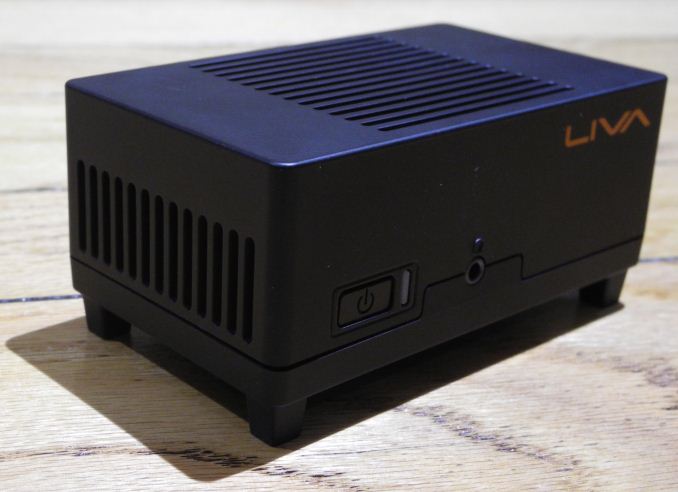ECS LIVA Review: The Nettop Rises Again
by Ganesh T S on July 18, 2014 9:15 AM ESTConcluding Remarks
Coming to the business end of the review, it is clear that ECS must be applauded for trying to resurrect the nettop by cutting the appropriate corners while delivering a better performing machine (compared to older nettops) in a fanless chassis. The absence of SATA and SODIMM slots reduce the BOM cost and the eventual end-price for consumers (which is the reason the ECS LIVA is cheaper than a Bay Trail NUC). The use of a micro-USB conenction for power gives rise to interesting use-cases. For example, a TV with an USB port delivering around 10 W of power should be enough to run this unit for almost all common tasks.
On the flip side, the LIVA kit does have aspects that can be fixed by ECS. One of our major peeves was the positioning of the two USB ports. The placement between the micro-USB power inlet and the HDMI port makes it very difficult to utilize the USB ports (particularly for thick thumb drives). One or both of the USB ports need to be either in the front or on the sides. In addition, the Celeron N2806 SoC inside the LIVA kit doesn't have Quick Sync enabled. At the same price point, Intel has a new stepping which includes Quick Sync (the Celeron N2807). Quick Sync can enable some interesting use-cases. It would be good on ECS's part to integrate a Bay Trail-M part with Quick Sync enabled in the LIVA kits. In terms of storage, 32 GB of eMMC turns out to be very less after installing a couple of Windows updates. 64 GB should be the minimum, particularly since flash storage needs plenty of free capacity in order to maintain performance.
Back to the bigger picture, the question here is obviously the effect of LIVA on the nettop category. ECS has managed to put out a product which delivers better performance per dollar and better performance per watt compared to previous generation nettops. The category itself (small, underpowered machines used for basic computing tasks) has received a boost thanks to Chromebooks (and, in turn, Chromeboxes). The potential market for the LIVA could be further expanded if ECS were to get Chrome OS to run on it (though I personally prefer the flexibility offered by Windows), or if Windows were to be supplied for free (given that Microsoft is essentially not charging license fees for certain classes of products now, in order to compete with the Chromebooks and Chromeboxes). The ability to run Windows on this miniature unit, while being fanless in nature, should prove to be a great selling point for the unit. I do hope ECS will make note of some of the suggestions above (particularly with respect to the motherboard / chassis design) for future products in the LIVA lineup.











55 Comments
View All Comments
eastcoast_pete - Saturday, July 19, 2014 - link
I second the comments regarding netbooks made here. Trying to do some actual writing on touch screens is a pain, even on larger tablets. I considered Chromebooks , but Google's "required tethering" approach doesn't work for me. I'd love to see MS helping to push a bunch of "Chromebook killers" into the market - Windows netbooks in the $180 - $ 300 price range with the new Baytrail Celerons, 3 or 4 Gb RAM, a 10" -12" high-res screen (no-touch), USB 3 port(s), micro-SXDC slot, and either 64 Gb eMMC 5.0 (lower price point) or 128 Gb SSD (higher). This nettop shows that it could be done. Now, if only MS would see the opportunity and seize it!esgreat - Sunday, July 20, 2014 - link
With max power around 12W and idle power around 4W, I guess I could run this thing at nominal speed with a power bank!Laststop311 - Sunday, July 20, 2014 - link
I personally would rather pay the 800 for the i7-4770r brix system. It must be rough to not have enough money to get the things u want. I don't know how to compromise so news about these systems heavily bores me.AmericanIdle - Friday, August 15, 2014 - link
You were so bored by this story that you felt inspired to leave a comment?The Brix is not fanless, and thus not silent. Also, it uses about 10 times as much power, which matters if you care about the future of the planet. It must be rough to know the price of everything and the value of nothing. I hope you learn how to compromise someday!
Haravikk - Thursday, July 24, 2014 - link
I don't really see the appeal of going so small with so many sacrifices personally, I mean Thin Mini-ITX cases like the Akasa Euler are still tiny machines (about Mac Mini size but a bit taller) and you can put proper desktop processors in them! You can even build a basic dual core system at a very reasonable price. This is why I never liked the idea of a Netbook; they never saved enough money to justify their horrific performance IMO, even when used for nothing but browsing (especially with the increasing demands of modern web content).